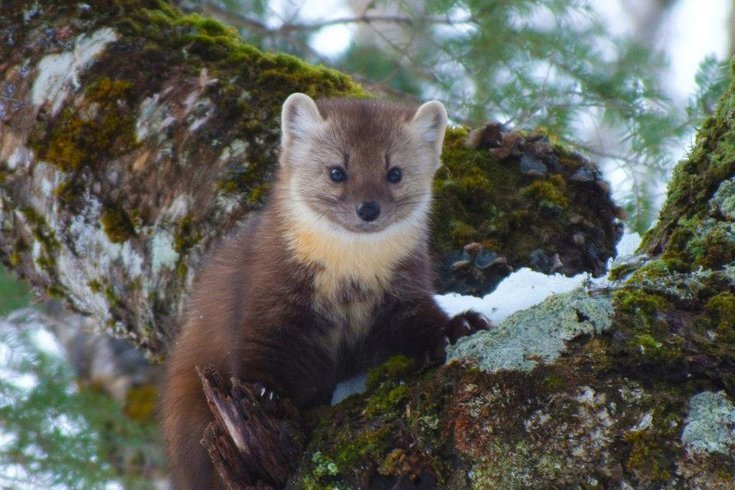
January 29, 2024
 BAILEY PARSONS/CREATIVE COMMONS
BAILEY PARSONS/CREATIVE COMMONS
The Pennsylvania Game Commission has decided to pause a plan that would restore the state's population of the American marten, a weasel species that hasn't lived in the state since the early 20th century.
A proposal to repopulate Pennsylvania with American martens — a wiry species of weasel similar to the mink and fisher — will not move forward without further research into a plan that was put forth by members of the state's Game Commission in recent years.
The board of commissioners voted 6-3 to table the plan during a Saturday meeting in Harrisburg, where wildlife officials weighed mixed public feedback on the proposal. Although the general public had been overwhelmingly supportive of the plan, a more comprehensive survey of hunters revealed conflicting views on the American marten's return.
Once a common denizen of Pennsylvania's northern counties, the omnivorous mammal — known for its soft, dense fur that ranges seasonally from yellow to dark brown — was gradually wiped out by the expansion of the fur trade and deforestation that came with European settlement. The species, which is set apart from other weasels by an orange or blonde patch of fur near the throat, has only rarely surfaced in isolated pockets of Pennsylvania since the early 20th century. It remains prevalent in upland habitats in the Northeast U.S. and Canada, where it feeds on amphibians, reptiles, insects, birds and small mammals and avoids predators like hawks, owls and bobcats.
Two years ago, the Pennsylvania Game Commission's Bureau of Wildlife Management put together a feasibility study for the reintroduction of the American marten. The plan would build on the success of similar programs that have helped restore populations of eagles, beavers, river otters and other native Pennsylvania wildlife over the last several decades. States like Vermont and Montana, which was once home to the related Pacific marten, have brought native marten species back using similar plans. Populations are translocated from other states and then monitored over time to see how the species fares in its new territories.
The 10-year plan proposed by the Pennsylvania Game Commission looked at factors such as habitats, future climate impacts and anticipated interactions between American martens and other species. Biologists cited possible advantages, including better control of rodent populations, seed dispersal, new game for hunters and reconnecting Pennsylvania with a part of its natural history that was once important to the state's Indigenous communities.
A pair of public opinion polls conducted in 2022 and 2023, each with just over 1,000 respondents statewide, found that about 91% of Pennsylvania residents supported bringing back American martens, according to data included in the reintroduction plan. But a Game Commission survey of about 9,000 hunters was less clear-cut. About 37% supported marten reintroduction, 32% opposed it and 31% were neutral toward the plan.
The commissioners who voted against moving forward with the plan said the agency has more outreach to do with hunters.
Commissioner Robert Schwalm, who voted against proceeding with the plan, said he was concerned about changes to the state's forests and climate since the last time American martens lived here. He said more research needs to be done to consider whether the species can last in Pennsylvania long-term.
Although the board's vote puts the reintroduction of the American marten in question, the plan could still be revisited in future years.
The initiative has been championed by Thomas Keller, a furbearer biologist with the Game Commission, who told the Sierra Club last year the American marten deserves to join the line of species that have been reintroduced in Pennsylvania.
"My grandparents’ generation reintroduced the white-tailed deer and the turkey," Keller said. "My parents’ generation reintroduced the bald eagle and the river otter. Our generation has a new opportunity to reintroduce the marten."